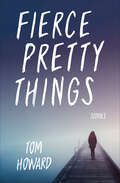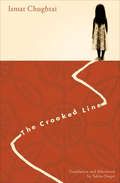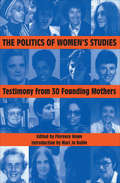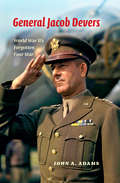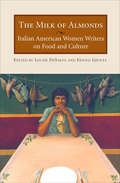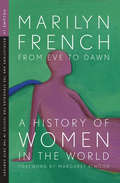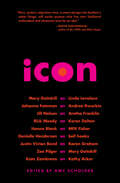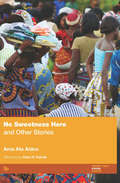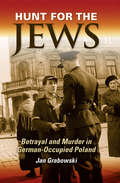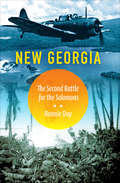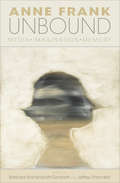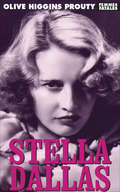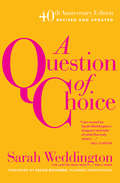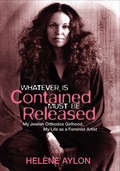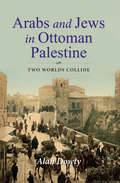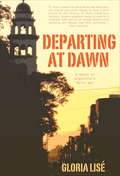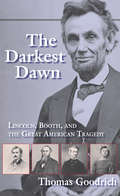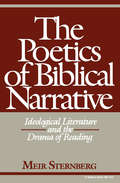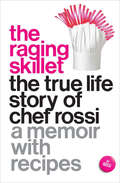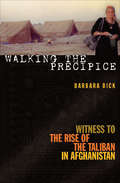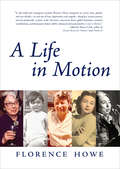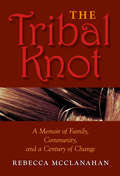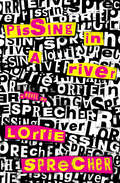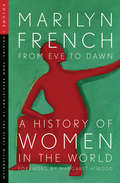- Table View
- List View
Fierce Pretty Things: Stories (Blue Light Books)
by Tom HowardThis debut story collection from the Tobias Wolff Award–winning author &“is streaked with fantasy that deconstructs society&’s lost and wasted lives&” (Publishers Weekly). In these eight darkly comic stories, acclaimed author Tom Howard explores the conflicting instincts for tenderness and violence that mark his character&’s lives. A brother and sister wander the pier after a deadly plague destroys most of humanity. A high school bully struggles to overcome his demons. A man in the grips of dementia is visited by his children&’s ghosts. The people in these tales grapple with past mistakes, trying to navigate their way toward redemption and resurrection. Though they often fail, they strive with ferocious hearts as their voices guide us through schoolyards, cemeteries, drive-in theaters, and the rich landscapes of their own imaginations.
The Crooked Line (Women Writing The Middle East Ser.)
by Ismat ChughtaiA young Indian woman searches for her own identity as her country fights for independence in this novel from the award-winning Urdu Indian author. The Crooked Line is the story of Shamman, a spirited young woman who rebels against the traditional Indian life of purdah, or female seclusion, that she and her sisters are raised in. Shipped off to boarding school by her family, Shamman grows into a woman of education and independence just as India itself is fighting to throw off the shackles of colonialism. Shamman&’s search for her own path leads her into the fray of political unrest, where her passion for her country&’s independence becomes entangled with her passion for an Irish journalist. In this semi-autobiographical novel, Ismat Chughtai explores the complex relationships between women caught in a changing culture, and exposes the intellectual and emotional conflicts at the heart of India&’s battle for an uncertain future of independence from the British Raj and ultimately Partition.
The Politics of Women's Studies: Testimony from 30 Founding Mothers (The\women's Studies History Ser.)
by Edited by Florence Howe and Introduction by Mari Jo BuhleThe true stories of those bold women who espoused feminism in the world of academia and forever changed our educational system and culture. In the patriarchal halls of 1970s academe, women who spoke their minds risked their careers. Yet intrepid women—students, faculty, administrators, members of the community—persisted in collaborating on women&’s studies programs. In doing so, they created a movement that altered paradigms, curricula, teaching styles, and content across disciplines. In these original essays &“we hear the voices of feminists exhilarated by the opportunities and challenges of creating women&’s studies programs in American colleges and universities, nurtured by the women&’s movement of the 1970s,&” from young graduate students and newly hired faculty to tenured professors in search of ways to improve their students&’ capacities to learn, veteran academics at last witnessing change, and even a few administrators (Library Journal). In all of these programs, these &“founding mothers&” grappled not only with issues of gender, but with those of class, race, and sexuality in a decade infused with political unrest and questioning, when civil rights and anti-war activism, as well as feminism, shaped academic worlds.
General Jacob Devers: World War II's Forgotten Four Star
by John A. AdamsA &“solid and informative&” biography of one of the overlooked heroes of the Second World War (Wall Street Journal). Of the leaders of the American Army in World War II, Jacob Devers is undoubtedly the &“forgotten four-star.&” Plucked from relative obscurity in the Canal Zone, Devers was one of four generals selected by General of the Army George Marshall in 1941 to assist him in preparing the Army for war. He quickly became known in Army circles for his &“can do&” attitude and remarkable ability to cut through red tape. Among other duties, he was instrumental in transforming Ft. Bragg, then a small Army post, into a major training facility. As head of the armored force, Devers contributed to the development of a faster, more heavily armored tank, equipped with a higher velocity gun that could stand up to the more powerful German tanks, and helped to turn American armor into an effective fighting force. In spring 1943, Devers replaced Dwight Eisenhower as commander of the European Theater of Operations, then was given command of the 6th Army Group that invaded the south of France and fought its way through France and Germany to the Austrian border. In the European campaign to defeat Hitler, Eisenhower had three subordinate army group commanders: British Field Marshall Bernard Montgomery, Omar S. Bradley, and Jacob Devers. The first two are well-known; here the third receives the attention he properly deserves.
The Milk of Almonds: Italian American Women Writers on Food and Culture
by Edited by Louise DeSalvo and Edvige Giunta&“A vast, thoroughly wonderful assortment of poetry, memoirs and stories . . . that defines today&’s female Italian-American experience&” (Publishers Weekly). Often stereotyped as nurturing others through food, Italian-American women have often struggled against this simplistic image to express the realities of their lives. In this unique collection, over 50 Italian-American female writers speak in voices that are loud, boisterous, sweet, savvy, and often subversively funny. Drawing on personal and cultural memories rooted in experiences of food, they dissolve conventional images, replacing them with a sumptuous, communal feast of poetry, stories, and memoir. This collection also delves into unexpected, sometimes shocking terrain as these courageous authors bear witness to aspects of the Italian American experience that normally go unspoken—mental illness, family violence, incest, drug addiction, AIDS, and environmental degradation. As provocative as it is appetizing, &“this collection of verse and prose pieces . . . reveals the evocative and provocative power of food as event and as symbol, as well as the diversity of these women&’s lives and their ambivalence regarding the role of nurturer&” (Library Journal).
From Eve to Dawn: Revolutions and the Struggles for Justice in the 20th Century (Origins #4)
by Marilyn FrenchThe conclusion of the &“remarkable&” four-volume history by the New York Times–bestselling author of The Women&’s Room (Publishers Weekly). In the twentieth century, women became a force for change, in part through suffrage, and in part through mass organizing. This final volume of Marilyn French&’s wide-ranging survey offers a vibrant history of multiple political revolutions as well as the century&’s horrors—including genocides and the atom bomb. It ends with a thoughtful investigation into the various indigenous feminist movements throughout the world and asks what these peaceful revolutions might augur for the future. Eschewing easy answers, French suggests that the defining moral moments of the twenty-first century should, and will, build from a global human rights agenda.
Icon
by Mary Gaitskill Johanna Fateman&“In this collection commissioned by Amy Scholder, nine original essays explore the specific and personal impact of cultural icons.&” —Publishers Weekly Whose poster hung on your wall as a teenager? Whose record did you wear out? Whose life story could you not resist? Fascination works in mysterious ways—it can be born out of inspiration, or repulsion, or both. In these daring essays, some of the most provocative writers of our time offer a private view on a public figure. In the process, they reveal themselves in beautiful and unexpected ways, blurring the line between biography and memoir. Original essays include Introduction by Amy Scholder, Mary Gaitskill on Linda Lovelace, Rick Moody on Karen Dalton, Johanna Fateman on Andrea Dworkin, Danielle Henderson on bell hooks, Hanne Blank on MFK Fisher, Kate Zambreno on Kathy Acker, Justin Vivian Bond on Karen Graham, Jill Nelson on Aretha Franklin, and Zoe Pilger on Mary Gaitskill &“A smart plunge into fandom&’s sober fringe.&” —Wayne Koestenbaum, author of My 1980s and Other Essays
No Sweetness Here: And Other Stories
by Ama Ata AidooFrom the author of Changes: these stories &“of post-independence Ghana in the late 1960s are written beautifully and wisely and with great subtlety&” (Chimamanda Ngozi Adichi). In this short story collection, the award-winning poet and author of Changes and Our Sister Killjoy explores postcolonial life in Ghana with her characteristic honesty, humor, and insight. A house servant wonders what independence means in a country where indoor plumbing is still reserved for bosses. A brother tracks down his runaway sister only to find she has become a prostitute. In the title story, a bitter divorce turns tragic when the couple&’s only child dies of a snake bite. In these and other stories, tradition wrestles with new urban influences as Africans try to sort out their identity in a changing culture, and &“even at her gravest, Miss Aidoo writes with a sunny charm&” (The New York Times).
Hunt for the Jews: Betrayal and Murder in German-Occupied Poland
by Jan GrabowskiA revealing account of Polish cooperation with Nazis in WWII—a &“grim, compelling [and] significant scholarly study&” (Kirkus Reviews). Between 1942 and 1943, thousands of Jews escaped the fate of German death camps in Poland. As they sought refuge in the Polish countryside, the Nazi death machine organized what they called Judenjagd, meaning hunt for the Jews. As a result of the Judenjagd, few of those who escaped the death camps would survive to see liberation. As Jan Grabowski&’s penetrating microhistory reveals, the majority of the Jews in hiding perished as a consequence of betrayal by their Polish neighbors. Hunt for the Jews tells the story of the Judenjagd in Dabrowa, Tarnowska, a rural county in southeastern Poland. Drawing on materials from Polish, Jewish, and German sources created during and after the war, Grabowski documents the involvement of the local Polish population in the process of detecting and killing the Jews who sought their aid. Through detailed reconstruction of events, &“Grabowski offers incredible insight into how Poles in rural Poland reacted to and, not infrequently, were complicit with, the German practice of genocide. Grabowski also, implicitly, challenges us to confront our own myths and to rethink how we narrate British (and American) history of responding to the Holocaust&” (European History Quarterly).
New Georgia: The Second Battle for the Solomons (Twentieth-Century Battles)
by Ronnie Day&“A detailed, up-to-date, integrated air-land-sea history&” of a pivotal WWII campaign in the Pacific from both American and Japanese perspectives (Vincent P. O'Hara, author of In Passage Perilous). In 1942, the Solomon Islands formed the stepping stones toward Rabaul, the main base of Japanese operations in the South Pacific, and the Allies&’ primary objective. The stunning defeat of Japanese forces at the Naval Battle of Guadalcanal in November marked the turning point in the war against Japan and the start of an offensive in the Central Solomons aimed at New Georgia. New Georgia: The Second Battle for the Solomons tells the story of the land, sea, and air battles fought there from March through October 1943. Making careful and copious use of both Japanese and Allied sources, Ronnie Day masterfully weaves the intricate threads of these battles into a well-crafted narrative of this pivotal period in the war. As Day makes clear, combat in the Solomons exemplified the war in the Pacific, especially the importance of air power, something the Japanese failed to understand until it was too late, and the strategy of island hopping, bypassing Japanese strongholds (including Rabaul) in favor of weaker or more strategically advantageous targets. This multifaceted account gives the fighting for New Georgia its proper place in the history of the drive to break the Japanese defensive perimeter and bring the homeland within range of Allied bombers.
Anne Frank Unbound: Media, Imagination, Memory (The Modern Jewish Experience)
by Barbara Kirshenblatt-Gimblett and Jeffrey Shandler&“A brilliantly conceived and long overdue opening up [or deconstruction] of the Anne Frank story.&” —James Clifford, Professor Emeritus, History of Consciousness Department, University of California As millions of people around the world who have read her diary attest, Anne Frank, the most familiar victim of the Holocaust, has a remarkable place in contemporary memory. Anne Frank Unbound looks beyond this young girl&’s words at the numerous ways people have engaged her life and writing. Apart from officially sanctioned works and organizations, there exists a prodigious amount of cultural production, which encompasses literature, art, music, film, television, blogs, pedagogy, scholarship, religious ritual, and comedy. Created by both artists and amateurs, these responses to Anne Frank range from veneration to irreverence. Although at times they challenge conventional perceptions of her significance, these works testify to the power of Anne Frank, the writer, and Anne Frank, the cultural phenomenon, as people worldwide forge their own connections with the diary and its author. &“This collection of brilliant essays offers fascinating and unexpected insights into the significance of Anne Frank&’s iconic Holocaust-era diary from many disciplinary perspectives in the arts and humanities.&” —Jan T. Gross, the Norman B. Tomlinson Professor of War and Society, Princeton University &“This volume is a major contribution to scholarship regarding Anne Frank's diary and its cultural influence . . . Highly recommended.&” —Choice &“Engrossing . . . The overall aim is to provide a greater understanding of the general and particular engagement with Anne Frank as a person, a symbol, an icon, an inspiration, and perhaps most polarizing, as one victim, not the victim of the Nazi holocaust.&” —Broadside
Stella Dallas: Bobbie: General Manager, The Fifth Wheel, Stella Dallas (Femmes Fatales)
by Olive Higgins ProutyThis pulp classic of motherhood and money introduced the immortal character portrayed on film by Barbara Stanwyck and Bette Midler—&“a feminist gem&” (Michael Bronski). An ambitious woman from working-class roots, Stella sets her sights on marrying rich—and hits a bullseye. But her unshakable crudeness becomes too much for her husband. When he leaves her, she keeps their daughter Laurel. And now Stella sets her sights one again—this time, on giving her daughter the life she could never achieve for herself. Originally published in 1923, this epic tale inspired the first radio soap opera, a Broadway play, and multiple films, including the Oscar-nominated 1937 movie starring Barbara Stanwyck and the 1990 movie Stella starring Bette Midler. Stella Dallas is a razor-sharp critique of our societal obsession with the judgment of mothers, offering cultural commentary that is still shockingly relevant nearly one hundred years after its initial publication.
A Question of Choice: Roe V. Wade 40th Anniversary Edition
by Sarah WeddingtonA memoir filled with &“valuable, passionate insights&” from the lawyer who argued the landmark Roe v. Wade case to the Supreme Court (Kirkus Reviews). More than 40 years ago, the highest court in the land handed down a decision that would forever alter the lives of women throughout the United States. Roe v. Wade became the seminal lawsuit that gave American women the legal right to abortion. Weddington, just 27 years old in 1973, became a key figure in the reproductive rights movement when she took on the case. Here she recounts her remarkable story, from her personal experience with abortion and the workforce discrimination she faced in her early career to the judicial proceedings and long journey she has undertaken in fighting for women&’s rights since. As divisive as ever, the famous decision is continually threatened by organized pro-life groups. Weddington compels &“those who are willing to share the responsibility of protecting choice,&” to follow her plan of action in supporting the legal rights of women. A Question of Choice is an &“eloquent reminder of what Roe truly means—that our most private decisions can be made behind the closed doors of our homes, with our families, and in private conversations with our hearts&” (Former President Bill Clinton).
Whatever Is Contained Must Be Released: My Jewish Orthodox Girlhood, My Life as a Feminist Artist (Jewish Women Writers Ser.)
by Helène Aylon&‘[A] richly evocative, captivating, and reflective memoir&” of a feminist artist who broke free of the limits placed on her by family, Judaism and society (Publishers Weekly). Growing up an Orthodox Jew in Brooklyn, Helene Aylon spent her Friday nights in a sea of extended family as the Sabbath candles flickered. Passionate about art, she dreamt of escaping the strict, secular world of her youth, but instead married a rabbi and became a mother of two. Then, her world was split apart when her husband was diagnosed with cancer, and Aylon found herself widowed at thirty. Free to explore both her own soul and the changing world around her, Aylon sought a home in the burgeoning environmental art scene of the 1970s—creating transgressive works that explore identity, women&’s bodies, the environment, disarmament, and the notion of God. Finally, she dares to asks of Judaism: Where are the women? With many examples of her work included within, Whatever is Contained &”is an arresting tale of uncommon courage, intelligence, and wit&” following Aylon&’s search for truth in art, and the links between feminism and Judaism (Gail Levin, author of Lee Krasner: A Biography and Becoming Judy Chicago).
Arabs and Jews in Ottoman Palestine: Two Worlds Collide (Perspectives On Israel Studies)
by Alan DowtyThe historian and expert on Israeli-Palestinian relations offers &“a well-written, well-balanced&” account of cultural conflicts in the region before WWI (Anita Shapira, author of Israel: A History).When did the Arab-Israeli conflict begin? Some discussions focus on the 1967 war, some go back to the creation of the state of Israel in 1948, and others look to the beginning of the British Mandate in 1922. Alan Dowty, however, traces the earliest roots of the conflict to the Ottoman Empire in the 19th century, arguing that this historical approach highlights constant clashes between religious and ethnic groups in Palestine. Dowty demonstrates that, during the 19th century, there was an overwhelming hostility to European foreigners, and that Arab residents viewed new Jewish settlers as European. He also shows that Jewish settlers had tremendous incentive to minimize all obstacles to settlement, including the inconvenient hostility of the existing population. Dowty's thorough research reveals how events that occurred over 125 years ago shaped the implacable conflict that dominates the Middle East today.
Departing at Dawn: A Novel of Argentina's Dirty War
by Gloria Lisé&“[A] quiet, powerful novel&” of a young woman caught in the chaos of Argentina in the mid-1970s, when speaking against the government could mean death (Publishers Weekly). March 23, 1976. Berta watches horrified as her lover, a union organizer named Atilio, is thrown from a window to his death by soldiers. The next day, Colonel Jorge Rafael Videla stages a coup d&’état and a military dictatorship takes control of Argentina. And even though she was never a part of Atilio&’s union efforts, Berta is on a list to be &“disappeared.&” Fleeing to relatives in the countryside, she becomes part of the family she knows only from old photographs: Aunt Avelina, who blasts music from an old record player; Uncle Nepomuceno, who watches slugs slither in the garden every afternoon; and Uncle Javier, who sits in his tiny grocery store day and night. But soon enough, Berta realizes she must run even further to save her life—and those she has come to love. With a prose that is light yet penetrating, Gloria Lisé has written &“a beautifully simple, poetic story of solidarity and love, with memorable characters painted in the tender strokes of a watercolor&” (Luisa Valenzuela, author of Black Novel with Argentines).
The Darkest Dawn: Lincoln, Booth, and the Great American Tragedy
by Thomas GoodrichThe story of the Lincoln assassination and its aftermath, captured with you-are-there immediacy. It was one of the most tragic events in American history: The famous president, beloved by many, reviled by some, murdered while viewing a play at Ford&’s Theater in Washington. The frantic search for the perpetrators. The nation in mourning. The solemn funeral train. The conspirators brought to justice. Coming just days after the surrender of the Confederate Army at Appomattox, the assassination of Abraham Lincoln has become etched in the national consciousness like few other events. The president who had steered the nation through its bloodiest crisis was cut down before the end, just as it appeared that the bloodshed was over. The story has been told many times, but rarely with the immediacy of The Darkest Dawn. Thomas Goodrich brings to his narrative the care of the historian and the flair of the fiction writer. The result is a gripping account, filled with detail and as fresh as today&’s news. &“Among the hundreds of books published about the assassination of our 16th president, this is an exceptional volume.&” —Frank J. Williams, founding Chair of The Lincoln Forum
The Poetics of Biblical Narrative: Ideological Literature and the Drama of Reading (Indiana Studies In Biblical Literature Ser. #No.453)
by Meir SternbergMeir Sternberg&’s classic study is &“an important book for those who seek to take the Bible seriously as a literary work.&” (Adele Berlin, Prooftexts) In &“a book to read and then reread&” (Modern Language Review), Meir Sternberg &“has accomplished an enormous task, enriching our understanding of the theoretical basis of Biblical narrative and giving us insight into a remarkable number of particular texts.&” (Journal of the American Academy of Religion). The result is a &“a brilliant work&” (Choice) distinguished &“both for his comprehensiveness and for the clearly-avowed faith stance from which he understands and interprets the strategies of the biblical narratives.&” (Theological Studies). The Poetics of Biblical Narrative shows, in Adele Berlin&’s words, &“more clearly and emphatically than any book I know, that the Bible is a serious literary work―a text manifesting a highly sophisticated and successful narrative poetics.&”
The Raging Skillet: The True Life Story of Chef Rossi: A Memoir with Recipes
by Rossi&“[A] juicy memoir about growing up, becoming a chef, and working as New York&’s most unconventional wedding caterer.&” —BUST magazine When their high-school-aged, punk, runaway daughter is found hosting a Jersey Shore hotel party, Rossi&’s parents feel they have no other choice: they ship her off to live with a Chasidic rabbi in Crown Heights, Brooklyn. Within the confines of this restrictive culture, Rossi&’s big city dreams take root. Once she makes her way to Manhattan, Rossi&’s passion for cooking, which first began as a revolt against the microwave, becomes her life mission. The Raging Skillet is one woman&’s story of cooking her way through some of the most unlikely kitchens in New York City—at a &“beach&” in Tribeca, an East Village supper club, and a makeshift grill at Ground Zero in the days immediately following 9/11. Forever writing her own rules, Rossi ends up becoming the owner of one of the most sought-after catering companies in the city. This heartfelt, gritty, and hilarious memoir shows us how the creativity of the kitchen allows us to give a nod to where we come from, while simultaneously expressing everything that we are. This &“moving, witty memoir&” (Nigella Lawson) includes unpretentious recipes for real people everywhere. &“A humorous and witty chronicle of a woman&’s pulling-herself-up-by-her-bootstraps rise through the culinary ranks.&” —Kirkus Reviews
Walking the Precipice: Witness to the Rise of the Taliban in Afghanistan
by Barbara BickAn &“enthralling&” memoir of a woman who risked her life to help a people under siege and a country caught between freedom and oppression (Publishers Weekly—starred review). In 1990, sixty-five-year-old activist and grandmother Barbara Bick traveled with a women&’s delegation to Afghanistan for what she thought would be her last great adventure. Instead, Bick forged deep friendships with her Afghan hosts—only to watch in horror as the Taliban took over most of the country and instituted fiercely anti-woman policies. Eleven years later, at age 76, Bick returned to Afghanistan, travelling to the region controlled by the Northern Alliance, an anti-Taliban militia. In early September 2001, Bick walked out of a compound where militia leader Ahmad Shah Massoud was also staying. Minutes later, Taliban infiltrators assassinated Massoud—a prelude to the al Qaeda attacks on the United States. As the US government became deeply involved in Afghanistan, Bick decided to return once again to see how women were faring under the new government. In 2004, she was one of the few Western women able to bring years of experience to understanding the country&’s trauma. Walking the Precipice gives new insight into the people, politics, and culture of a country that is on everyone&’s radar—for its beauty, and for its tragic place history.
A Life in Motion (Jewish Women Writers Ser.)
by Florence Howe&“A sharp and compelling memoir&” of a feminist icon who forged positive change for herself, for women everywhere, and for the world (Rosemary G. Feal, executive director of the Modern Language Association). Florence Howe has led an audacious life: she created a freedom school during the civil rights movement, refused to bow to academic heavyweights who were opposed to sharing power with women, established women&’s studies programs across the country during the early years of the second wave of the feminist movement, and founded a feminist publishing house at a time when books for and about women were a rarity. Sustained by her relationships with iconic writers like Grace Paley, Tillie Olsen, and Marilyn French, Howe traveled the world as an emissary for women&’s empowerment, never ceasing in her personal struggle for parity and absolute freedom for all women. Howe&’s &“long-awaited memoir&” spans her ninety years of personal struggle and professional triumphs in &“a tale told with startling honesty by one of the founding figures of the US feminist movement, giving us the treasures of a history that might otherwise have been lost&” (Meena Alexander, author of Fault Lines).
Dream Homes: From Cairo to Katrina, an Exile's Journey (Jewish Women Writers Ser.)
by Joyce ZonanaThe American daughter of Egyptian Jewish immigrants journeys in search of belonging from Brazil to New Orleans and beyond—includes recipes and photos! Born to Egyptian Sephardic Jews who fled to the United States after the Arab-Israeli war of 1948, Joyce Zonana spent her childhood in Brooklyn. But her experience of Jewish culture was very different from that of the other children she knew, from the foods they ate to the language they spoke. As she struggled to find a sense of inclusion, never feeling completely American or completely Egyptian, a childhood trip to Brazil became the basis for a lifelong quest to find her place in the world. Meeting members of her extended family who had migrated to Brazil was one step in discovering the kind of life she might have lived in Egypt, and exploring the woman she was becoming. Through travels that ranged from Cairo to Oklahoma and finally New Orleans in the shadow of Katrina, and including an evocative exploration of the way food varies from culture to culture, this is a &“frank, spirited memoir of identity from a Brooklyn-raised, Egyptian-born Jewish feminist.&” (Kirkus Reviews) &“Zonana makes every human encounter lively&” —Booklist
The Tribal Knot: A Memoir of Family, Community, and a Century of Change (Break Away Book Club Edition)
by Rebecca McClanahanThe Pushcart Prize-winning author&’s multi-generational memoir interweaves stories across more than a century in a &“loving reminder of the ties that bind&” (Lee Martin, From Our House and Turning Bones). Are we responsible for, and to, those forces that have formed us—our families, friends, and communities? Where do we leave off and others begin? In The Tribal Knot, award-winning poet and author Rebecca McClanahan mines her personal family history to explore provocative questions about legacy, identity, and familial connection. Poring over letters, artifacts, and documents that span more than a century, McClanahan discovers a tribe of hardscrabble Midwest farmers, hunters, trappers, and laborers struggling to hold tight to the ties that bind them, through poverty, war, political upheavals, illness and accident, filicide and suicide, economic depressions, personal crises, and global disasters. Like the practitioners of Victorian "hair art" who wove strands of family members' hair into a single design, McClanahan braids her ancestors' stories into a single intimate narrative of her search to understand herself and her place in the family's complex past.
Pissing in a River: A Novel
by Lorrie Sprecher&“An honest and genuine DIY punk-rock lesbian love story.&” —Kirkus Reviews Amanda moves to London with nothing but her guitar and her collection of punk music as the soundtrack to her every move. With the company of a few friendly voices in her head, she looks for—and finds—a best friend and new lover. She forms a band, Lesbian Raincoat, and completely rewrites the story of her life. In this irreverently funny yet profound novel, Amanda risks deportation, recalls the fervor of AIDS activism in the United States, connects to the class struggle of punk, and finds redemption in love. But she also must confront her own mental illness, her lover&’s rape, and the violence of post-9/11 politics. Pissing in a River captures the glee and turbulence of surviving the cacophony of modern life. &“A love letter to the obsessions that captivated an outcast generation: punk, politics, passion, and provocation.&” —Maria Raha, author of Cinderella&’s Big Score: Women of the Punk and Indie Underground
From Eve to Dawn: From Prehistory to the First Millennium (Origins #1)
by Marilyn FrenchThe first volume of the New York Times–bestselling author&’s monumental and unprecedented history: &“Consistently thought-provoking&” (The New York Review of Books). The internationally celebrated author of The Women&’s Room, Marilyn French spent over fifteen years with a team of researchers and prominent historians examining women&’s lives and activities in civilizations and societies spanning the ages. Beginning in prehistory, Origins moves on to examine women&’s lives in ancient Egypt, China, India, Peru, Mexico, Greece, and Rome. In her reconstruction of wars, laws, and other activities affecting both women and men, French also traces the worldviews underpinning them. She also depicts how women&’s relationship to Judaism, Christianity, and Islam changed for good and bad over the centuries. &“She backs up even her more controversial theories with an impressive accumulation of academically accepted historical, anthropological and sociological sources . . . Written in concise, understated language, this is a significant addition to literature on women&’s studies and history.&” —Publishers Weekly
